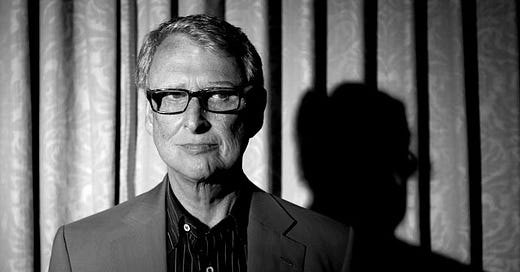Mike Nichols and Marian Seldes: On The Teaching of the Actor
“Actors are getting smaller and smaller."--Marian Seldes
Elaine Stritch thought that I should meet Mike Nichols and ask him questions about…everything.
In 1992 Nichols staged a reading of Peter Feibleman’s Cakewalk, a play about his relationship with Lillian Hellman. Stritch had been cast as Hellman, and the cast included Timothy Carhart, Elaine May, and Barbara Garrick. The reading took place in the McGinn/Cazale Theatre within the old and missed Promenade Theatre, on the wonderfully kitschy set for Theresa Rebeck’s Spike Heels.
As we gathered on the stage after the reading, Stritch walked over to me and pushed me into Mike Nichols. “Go!” she said. Nichols smiled and said, “I guess this is a form of meeting cute.”
When we met for our first interview, Nichols wanted to talk about the teaching and ambitions of actors. Not long before our meeting, Nichols had spent some time talking to Marian Seldes, who had recently left the Juilliard School, and she had told him something uncharacteristically dour: “Actors are getting smaller and smaller,” she told Nichols. “It’s no longer about building a foundation for a life; it’s about getting hyped up for an audition or an award.”
On that note, Nichols began talking:
What I honestly know--from experience--and what I most want to impart to others is that life is the source of all things creative. Stella Adler once told a student in class that his furnace was burning brightly and consistently, but it was heating up all the wrong things: He was obsessed with a career, with meeting people and making moves and always going upward, being seen, being noticed. Stella assured him that his motives were debased, and I think she was right. I think my motives have often been debased, and I regret everything I did or said or was during the times I acted upon the worst impulses available to me.
Among the creatives there is rampant unemployment, and so many of us sit around, empty, a ventriloquist dummy with no hand up our backs to animate us. Our life should animate us, and it remains a mystery to me that so many people I like and often admire have no concept of this. It is tragic to think that the career is the life: the career is an adjunct to the life.
I would suggest that a large life be pursued. I don't mean shooting at sharks from boats or scaling mountains, unless that is where your calling takes you. I'm talking about an expansion of the heart and the mind. See, read, listen to everything. Decide if it warrants your time. See how it--whatever it is--applies to your experience. Love fully and daily, whomever and whatever it may be.
Let the career grab you in the midst of your extraordinary life. Commit to the work. Apply what you've learned. That's where the good work will come from, always.
Good work and good artists are sacrificed daily to careerism, ambition, placement. Don't beg to have others look at you: Become so amplified by life that others cannot look away. Be the lesson.
Marian read these notes and she spoke to Nichols, and to me she added: I don’t feel comfortable being critical of others, but I don’t think a good teacher derives solely from classes taken or books read. So many acting classes today are full of aphorisms—”Be a bright blue!” “Be as big as your dreams!” I’m all for a positive attitude, but I could just as easily take myself to a medical school and exhort the students to be bold and proud, you are larger than any problem you might face, become the patient! This will no doubt make some people feel good, and I will get paid. However, someone will eventually ask me about, oh, open-heart surgery or new methods of incision, and what do I do? What do I say? Believe in yourself! It’s ludicrous. I need to have been in an operating room. I need to have performed surgery or a biopsy or diagnosed a skin cancer. I can’t have a feeling about it: I have to know it. Someone with whom I studied years ago became a teacher. He is a lovely man, and talented, but for whatever reason, he never worked much. Very little. I don’t know why. I don’t think his two years of study is sufficient to train a group of actors, because—and this is my opinion only—I think we’re training people to be actors for life, and I want for them a life of sanity and creativity and purpose and lifelong study. I used to tell students that we were training them for the long haul, and we were giving them skills that would help them beyond the acting. Well, that’s fading away. Now people charge a lot of money to get people worked up for an audition. Work that room! Seal the deal! And I do not think these people will be the good actors they might be, and I know they will not last the long haul.
© 2023 James Grissom





I am so grateful to you, James. Your work truly inspires. Thank you thank yo thank you/
Love this! Thank you. Mr. Grissom. A pleasure to be on your email list! Cheers to you!